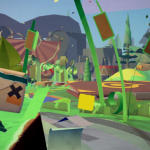Each week in Play in Process, Richard Clark shares what he’s been playing and why it matters.
There are very few games in existence that are centered around the Rapture. Of those games, I know of exactly zero that are any good. There’s a reason for that: the rapture is a relatively binary event. People are here, then people are not here. End of rapture. That’s no fun.
The fallout that comes after the rapture, that’s the interesting part. The Left Behind games dealt with this period, but the awkward eschatology and tone-deaf mechanics that pit believers against non-believers meant the game was known primarily for being both controversial and incredibly rote and dull.
Tokyo Jungle may very well be the Rapture game you’ve been waiting for (you have been anxiously waiting for a Rapture game, right?). It takes place after the mysterious disappearance of the human race; that’s all the game tells us. So what’s left? Animals. Because, as any orthodox theologian will tell you, animals don’t participate in Judgment Day. It’s just not their bag.
When you first start up the game, you can either play as a Pomeranian or a deer. Later you can unlock a cat, a beagle, a giraffe, and so on. Tokyo Jungle allows you to play as one of these remaining animals, surviving in a world that has been flipped upside-down: man no longer has dominion, animals no longer serve man. The world is given up and abandoned to those who are best at surviving.
Strictly speaking, we’re left with a world without humanity. Theologically speaking, the game’s setting is a world without spirituality, without emotional expression, without acts of love or kindness. There is no hope, because there is no need for hope. These things may appear to be present, but they are facades. When dogs appear angry, they are merely hungry. When hearts appear on the screen and two animals mate, they do so to further their species. The relationship is notably shallow and mechanical. When a new generation of puppies or kittens or giraffes is born, they will not grow up to do great things. They will live, eat, and die.
In fact, the Tokyo Jungle may be the most appropriate venue for a rogue-like game. The “rogue-like” genre refers to a type of game that challenges the player to survive as long as possible, exploring a world and acquiring upgrades, only to inevitably die and be forced to start from the beginning. In Tokyo Jungle, inevitable death is the only thing the world ultimately has to offer. Inevitable death is a popular trend in videogames these days, but few games pull off the implicit hopelessness of such a mechanic as well as Tokyo Jungle manages, simply because it presents a world abandoned not merely by civilization or the human race, but by God himself.
There are ways that the game attempts to humanize the animals, primarily by allowing the player to unlock absurd stories and odd apparel like camouflage hats, but these additions only serve to provide contrast to the unblinking harshness of nature and its inhabitants. Even when the jungle is concrete, these species, abandoned by their creator at least for a time, are taking matters into their own hands, and it’s not pretty.












